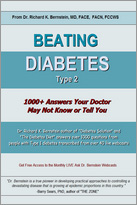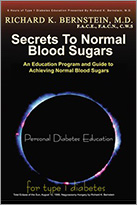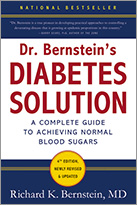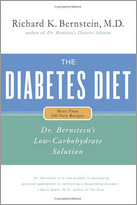by Patrick Totty
8 February 2008
Diabetes Health
Pioneering low-carb diet advocate Dr. Richard K. Bernstein has responded to the American Diabetes Association’s recent support for low-carb diets with a critique of several of the ADA’s most cherished notions.
In a recent “Ask Dr. Bernstein.com” tele-seminar presented to callers and listeners, he cited the ADA’s 2008 guidelines for doctors, disputing the association’s recommendations on several fronts:
- He said that the ADA’s definition of a low-carb diet as one with 130 or fewer grams of carbohydrates per day “is four times higher than what I recommend and makes it impossible to maintain [blood glucose] control.”
- He disputed the ADA’s contention that an A1c of less than 6 for people with diabetes increases the risk of hypoglycemia. “The risk is only to people taking the industrial insulin doses that the ADA recommends for covering their high-carbohydrate diets.
- Regarding the ADA’s recommendation that adults with diabetes shoot for blood sugar levels of 70 mg/dl to 130 mg/dl before meals and 180 mg/dl after meals – with even higher levels allowed for children – Dr. Bernstein said, “Children are not entitled to normal blood sugar levels? And neither are adults.” Those guidelines, he said, “were created by non-diabetics to be imposed upon diabetics.”
- Dr. Bernstein called the association’s recommendation that people with diabetes regularly see podiatrists to have their foot calluses debrided with a scalpel “the most dangerous thing you can do to a diabetic.” He said that 100 percent of the diabetic amputees he has ever interviewed in his university-based wound care clinic told him that their amputations arose from infections caused by an attempt to remove a callus – whether at the hands of a podiatrist, a family member or friend, or themselves. “I’ve seen too much of this. It’s a nice income for podiatrists, but sooner or later, someone goes too deep,” creating, he said, a wound that will not heal. Instead, he recommends using orthotics and shoe modifications to offload sites of high pressure or shear.
- He was perplexed by the ADA’s positive appraisal that “gastric reduction surgery (GRS) can be effective.” “We know about Symlin and Byetta, which when combined with a low-carb diet, are remarkably effective in curbing overeating and facilitating weight loss,” said Dr. Bernstein, “but the ADA doesn’t mention them at all in a 108-page set of guidelines. Yet it recommends the gastric surgery.”
- Dr. Bernstein asserted that the ADA’s recommendation of a diet rich in legumes, low-fat milk, whole grains, fruits and vegetables “creates sugar while fat does not.” He recalled being interviewed with an ADA dietician and asking her how she could recommend whole grain foods when they created high levels of blood glucose. To illustrate, he chewed a slice of whole-grain bread and applied the resulting saliva to a urine glucose test strip. The strip turned black immediately, indicating the instant conversion of the bread to glucose by saliva
. - Regarding the ADA’s recommendation that sucrose should be allowed in diabetic diets, Dr. Bernstein disputed it, saying that “insulin takes hours to catch up” to its effects.
Early Man Ate Few Carbs
In criticizing the ADA’s calling 130 grams of carbohydrates per day “low carbohydrate”, Dr. Bernstein cited early human history as an argument against it. “Until the creation of flour and bread, humans could not get anywhere near 130 grams a day.” The difficulty in securing such a large amount of carbohydrates made obesity and atherosclerosis rare in early humans.
But in the 20th century, as immense quantities of carbohydrates became available to large populations, the incidences of diabetes, heart attacks and strokes increased significantly.
Readers Comments
Posted by bdebruler on 15 February 2008
Dr Bernstein is great… st self promotion.
The whole stunt with bread and saliva: Salivary Amylase. Yes, he knows there is an enzyme that converts starch to sugar, he neglected to demonstrate other enzymes and biochemical pathways that can produce glucose from non-carbohydrate sources (granted those might be a bit more invasive).
Posted by anonymous on 15 February 2008
Thank G-d for Dr. Bernstein! He is truly my hero!
As for you T2s who eat more carbs and are able to maintain control … for how long? Enjoy it while it lasts. Hyperinsulinemia is not a healthful condition to have.
Posted by meanderingbrooks on 15 February 2008
I was dianosed DKA in late 2005 accompanied with metabolic syndrome. To date I am off all meds with the exception baby aspirin which I plan on taking for life. I’m 45 and after losing 70lbs of fat and adding 20lbs of muscle my A1c at last testing was 4.8. To achieve these results I read and tested every book and diet that wasen’t a fad and most of all sustainable to me for life. Dr.
Posted by mgordon on 15 February 2008
I am a Type I diabetic. My carbs were reduced to 130 and my Bloos sugars improved. I guess it all depends on the individual, metabolism, and daily exercise routine. I have frozen shoulder, knee injury, and 9 pins in one ankle.
Posted by anonymous on 15 February 2008
One thing I get from all this is that each diabetic reacts differently. You need to try different things and then you check your blood sugars to see how it works. I can not do whole grains – my blood sugar shoots above 250 within 30 minutes of the meal. I am not talking about whole grains in a bread – I put them, whole, in a pot and cooked them and then ate them no milk no sugars. Until Bernsteins book I thought I had no hope because the diet ADA recommended just lead me to higher blood sugar. I am glad some people can follow it and get low blood sugar wished I could. I am on low carb and 60 units of lantus a day and it still runs 149 to 225. Before low carb it was running around 398.
Posted by meanderingbrooks on 15 February 2008
Bernstein, Dr. Ornish, Dr.Mcdougall and Dr.Furhman are all on the right tract I apply all their knowledge and experance to achieve optimum health. Eat whole foods mostly veggies almost anything grown out of ground and exercise, exercise, exercise.
Posted by anonymous on 15 February 2008
Most of the people I see here in the comments section who say Dr. Bernstein’s diet is great are those who have applied it to themselves with great results. I’m one of them. As a 37-year type 1 diabetic, I can’t find enough good things to say about Dr. B! Hey, if some of you want to eat a lot more carbs, I have no quarrel with you–it’s your body. I agree it isn’t easy to stay on the Bernstein diet. On the other hand, at such low carb levels, I find the carb cravings are nearly non-existent.
Posted by anonymous on 15 February 2008
Dr. Bernstein’s approach saved my life. My fasting of 457 and A1c of 15 dropped to 5.0 after 4 months of eating low carb, moderate exercise and minimal metformin. The ADA approach of 150 carbs (per the diabetes dietitian) did nothing but keep my sugars high and push me towards insulin.
Posted by anonymous on 15 February 2008
My A1c went from a 9.0 at diagnosis, to a 5.4 in 6 months! I went low carb, and lost 50 lbs so far! I am very happy, and enjoy every new day of my second chance at life!
Posted by anonymous on 15 February 2008
I am a type 2 diabetic, who owes his health to Dr. Bernstein’s book. I am continually amazed by the failure of the ADA to see the obvious.
All carbs are converted into sugar when they enter the blood. Excessive sugar in the blood requires excessive insulin, and in time the excessive insulin produces insulin resistance. Eventually the beta cells cannot keep up with the insulin demand, and the blood sugar rises to harmful levels. The harmful blood sugar gradually destroys the beta cells and the blood sugar rises further, eventually destroying the body.
Posted by anonymous on 15 February 2008
I totally agree with Dr. Bernstein, the fact is, the more carbs you ear, the more insulin you have to take, and the more insulin you take, the greater the chances are of low blood sugars. It’s just as simple as that and people that want to ingest a lot of carbs are just fooling themselves and probably gaing a lot of weight.
Posted by anonymous on 15 February 2008
I’ve had Type 1 diabetes for 25 years. I read Dr. Bernsteins book about 10 years ago and followed his recommendation of an extremely low carb diet for about 5 years. Yeah, it works and my A1C’s were between 4.5 and 6. But at what cost? It is very difficult to live that diet every day for the rest of your life. His extreme views expect patients to be perfect. Diabetes is more than a disease of controlling blood sugars. Real people sometimes fail at eating perfectly and his whole “diabetes solution” puts you on a roller-coaster of emotional ups and downs. If you experience a high blood sugar you want to beat yourself up and can lead to one of the more serious complications of diabetes that no one seems to want to admit; depression. Anyone struggling to live the perfect diabetic life that you’ve been told is the only way, I recommend a different book called “Diabetes Burnout” by William Polonsky, PhD. That is a book that realizes you are a person made up of more than just the need to keep perfect blood sugars. Doctors need to look at the WHOLE person and the way their expectations effect their patients lives.
Posted by anonymous on 16 February 2008
This article is very helpfull to me, a
Type 1. I cut my carbs in half a couple of years ago and got some benefits. I will make further carb reductions to see if occasional cravings disappear. I will try that saliva test with whole wheat pita bread and again with no fat cheeses, with salmon, with cooked vegetables, with nuts and seeds, with various raw vegetables, with yoghurt, etc. Should be interesting. And I’m already exercising (walking & yoga) but could do a little more muscle building.
Posted by weg203 on 17 February 2008
yes, many need to wake up to drBernstein. i’m a 14-year type 2 and get discussed when diabetes educators allow too many carbs – why are so many such educators so obese?
Posted by anonymous on 17 February 2008
Let’s put this in perspective. A healthy person who does not have diabetes and is not overweight will have an A1c of 4.3 to 4.5%. They will have no risk factors for the complications of diabetes, so what would you like your A1c to be, Normal? If you have diabetes, it will be almost impossible to get to an A1c of less then 5% on a high carbo diet, without industrial doses of medication which then increases your risk for heart disease. Dr Bernsteins diet is not meant for everyone, but keeping your eyesight and kidneys just might be worth it.
Steve Freed, R.Ph., CDE, Publisher of www.diabetesincontrol.com and www.diabetes911.net
Posted by anonymous on 17 February 2008
After the birth of our 3rd child my wife became a type 2 diabetic;then progressed to needing insulin despite diet and exercise. We went on the Atkins low carb diet and within 4 weeks she was completely off insulin. As we continued she was able to reduce her type 2 medications significantly. She never encountered hypoglycemia. Now that Atkins is gone, Dr. B is the champion of truly healty eating and living. Most who argue with his work simply don’t have the will power to resist carbs and may lack the critical analytic ability to appreciate the results of his research.
Posted by Elza Ulpis on 17 February 2008
I was a retired Registered Nurse when I developed type 2 diabetes. My mother was the first one in our family. I attended 5 day Education classes, attended monthly support group past 12 yrs. Sulfonylureas were a bane to me. No matter how I tried to follow the eating rules, I ended with too many, scary, unexpected severe low blood sugars from a tiny pill. Waking up with apounding heart, sweaty face, running to the kitchen for panic eating, gaining 20# in the process. After many years of this I read Dr. Bernstein’s book. Stopped taking the ” killer pill” (sulfonylurea) , stayed only on metformin and walked every day. Not having severe low blood sugars was heaven. Lost 20#, cholesterol went up. Dr Bernstein does not give sulfonylureas to his patients. Recently my eye caught an article about MODY trype of diabetes. Mature Onset Diabetes of the Young. What is that about? Respectfully, Elza Ulpis, Omaha, NE.
Posted by anonymous on 2 March 2008
Article about MODY:
https://www.phlaunt.com/diabetes/14047009.php
I think the comments indicate the source of Dr. Bernstein’s frustration. Many comments show that people do extremely well on carbohydrate restriction. Others have made other accommodations, which I think Dr. Bernstein would support. It is that the ADA is determined to restrict the choices for PWD that is so upsetting. Although their recent guidelines for the first time gave limited support for low carb diets, the body of the article was intended to scare everybody away. The justification given was not scientific — carbs are an important source of energy! We are trying to reduce energy. The reason is that the committees that write these reports have a long history of ignoring the literature on low carb (they quote nothing recent in their guidelines) and a long history of not taking any responsibility for their inability to halt the epidemic of diabetes.
I think it is reasonable for people to write to the ADA and ask them to include on their panels, people with experience with low carb, in particular people who see its potential not just its “concerns.” Also, the NIH draws its guidelines from the ADA so it is your tax dollars that are supporting this biased point of view. It is reasonable to write to your elected officials and ask for congressional hearings to see why all points of view are not being considered.
If you do write, or if you have experience with low carbohydrate diets, you can document it with the Metabolism Society by writing to the director, Lauri Cagnassola ( lauricags@gmail.com ) and check out the website at https://www.nmsociety.org.
Posted by anonymous on 28 March 2008
To the person who challenged Dr. Bernstein’s science, have you read Gary Taubes book “Good CAlories, Bad Calories”? Talk about psuedo science…Honestly, my interaction with diabetic educators led to higher blood sugars,weight gain, larger doses of insulin, and alot more doctor visits as my diabetes seeme to get out of control. Hummmm, the medical community disputes treatment that leads to fewer doctor’s visits? Since going low carb, my hb1ac is much lower. Isn’t that what the goal is?
Posted by anonymous on 10 April 2008
I have to admit that I was shocked when I went to my first Diabetic class and was told that I need more Carbs….? Tryglecerides ring in at 2880. No not misprint 2880. Metphormin did not touch my blood sugar and then recently 2 weeks ago. Then I got rid of the carbs and started feeling better. Now they say more…?
Posted by loras65 on 17 April 2008
I have been a diabetic nurse educator for over 15 years, and watched as my patients over my career of over 40 years, struggled with their disease. First, most have little or no knowledge related to their disease, second they are placed on insulin doses that make them miserable-up and down blood sugars. Many doctrs do not recommend pumps for Type I patients in my area- I teach pump starts and see wonderful results. Next-I see dieticians putting people on diets with too many carb grams–I am a type II. I teach low carbs–30 per meal–OR LESS–and I focus on low glycemic foods—I cannot eat even 30 grams of WHEAT BREAD and feel OK or get a 140 or less blood sugar after I eat–BUT with rye I can–I stay on all low glycemic foods and never go over 20-30grams–or I feel like sleeping for 2 hours and get highs–Metformin is great, I hate to see people on gliburide etc..alway on a roller coaster-Why does the ADA state 2 hours post prandial a 160-180 is OK–I went to an FSU conference of endocrinologists and heard what I know to be true, that a 140 or over 2hr ppg is as high as you want to go—-




